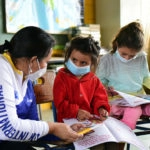Media Centre - Media release - 12 May 2021
Plan International’s 2021 Federal Budget Response
In response to tonight’s federal budget, handed down by Treasurer Josh Frydenberg, Plan International Australia CEO Susanne Legena said:
“Australia’s aid budget, delivered tonight, does not provide the ambitious and targeted new investments in our region needed to support our Indo-Pacific neighbours in their fight against and recovery from COVID-19”
“We remain deeply concerned that children and girls in the Asia Pacific will suffer without Australia’s long term investment in the economic and social recovery in the region following the devastating impacts of COVID 19.”
“We welcome Australia’s investment in the Pacific Women Lead Program of $170m. However, the new investment means little if the new Pacific Program does not focus on adolescent girls and young women who will be the next generation of leaders. Now is the time to build on the success of the Pacific Girl program and grow Australia’s focus on gender equality for girls.”
With some 34 million people on the brink of famine, the increase from $30m to $38m to the World Food Programme does not go nearly far enough in meeting the dire food shortages that are sweeping the globe.“It’s disappointing that the budget does not include a boost to Australia’s investment in the Global Partnership on Education or other education initiatives to get children, especially girls, back to school.”
With the GPE Pledging Conference to be held in the UK in late July of this year and the launch of the G7’s Girls’ Education Declaration last week, Plan International has called on the Government to increase its commitment from $30m to $70m per year for the next five years (in total $350m from 2021-2025).
“Disappointingly, Australia’s support for people with disabilities falls short with the 25% cut to the disability allocation from October 2020 remaining in place.”
“Australia’s contribution to the global aid effort has fallen by more than half in the last decade from contributing 3.7% of global aid in 2011 to a pitiful 1.6% in 2020. Australia now comes in third last of 22 OECD countries in aid generosity.”
“I know Australians are a generous community and when our neighbours are being devastated by COVID-19, Australians expect our government to be generous and to help our neighbours in their time of need,”
With over 380,000 COVID-19 cases daily in India and numbers growing in neighbouring countries including Bangladesh and Nepal, Ms Legena expressed concerns that not enough was being done for children in our neighbouring region.
“As we are witnessing alarming rises in death rates across the Asia-Pacific region, it is highly disappointing that Australia’s development assistance is declining.”
“With our region being upended by COVID-19 we know that more and more children, especially girls, are losing their education and losing all hopes of having a bright future.”
“Our recent reports Smart, Successful, Strong: The case for investing in adolescent girls’ education in aid and COVID-19 response and recovery and Halting Lives 2 – In Their Own Voice identifies the urgent and critical need to get girls back into education.”
“Girls identify education as their number one priority and we know that they are facing huge roadblocks to completing their education due to COVID-19. Investment in girls’ education globally is one of the single, most powerful interventions the Government can make to drive the COVID-19 response and recovery efforts in the Indo Pacific region.”
“Education has the ability to lift children, their families and communities out of poverty, and address the gender gap. With a predicted 38 million people falling below the poverty line in the Asia Pacific region alone, education is the best investment that donors and governments can make to empower children, youth and adults and break the cycle of poverty,” she said.
For further comment contact Plan International Australia Media and Ambassador manager James Norman 0451291775
Media contacts


